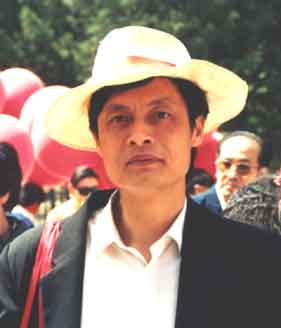 Born in 1948,Jiang Qisheng (江棋生) entered People’s University in Beijing as a PhD candidate in Philosophy, in Fall 1988. He participated in the 1989 Tiananmen students movement, and was arrested and imprisoned in Qincheng prison from September 1989 until February 1991. He continued to speak out since his first release, and again spent four years in prison from 1999-2003 after distributing pamphlets to commemorate the June 4 massacre. Jiang is a signatory of Charter 08, and the following excerpt is from his recent essay: A Couple of Things About Charter 08, via rfa.org, translated by CDT’s Linjun Fan:
Born in 1948,Jiang Qisheng (江棋生) entered People’s University in Beijing as a PhD candidate in Philosophy, in Fall 1988. He participated in the 1989 Tiananmen students movement, and was arrested and imprisoned in Qincheng prison from September 1989 until February 1991. He continued to speak out since his first release, and again spent four years in prison from 1999-2003 after distributing pamphlets to commemorate the June 4 massacre. Jiang is a signatory of Charter 08, and the following excerpt is from his recent essay: A Couple of Things About Charter 08, via rfa.org, translated by CDT’s Linjun Fan:
From the fact that Charter 08 has been released and embedded in China’s contemporary history, we can get an idea of what the drafters and signatories aim for. They are pursuing the spirit of civic participation, and they are advocating for a civil movement in China. Their goal is radically different from that of reformists or populists. The reformists look up to those in power for change, while the populists seek support from the general public. However, the proponents of Charter 08 got their spiritual inspiration from
Solzhenitsyn’s call to “Live Not By Lies,” Havel’s “Living in Truth” and Michnik’s “New Evolution.” Civic movements in such a spirit do not choose anonymity, do not engage in conspiracy, do not endorse violence, but resort to authenticity, openness, and nonviolence. Through these types of civic participation, more and more people liberate themselves and gradually change from being mere subjects to real citizens, and eventually live and work like free men. Their efforts will gradually bring about a civil society. And the space for totalitarian rulers and the authoritarian rulers will “decrease day by day, until they will not be able to stretch their arms or move their feet” (in the words of Mr. Yang Guang [another pro-democracy writer]).Eventually, just as Charter 08 has bravely declared, such a civic movement will either force the rulers to change the course of China, or become a Velvet Revolution to ultimately end the vicious cycle of the country’s political history, which always alternated between chaos and authoritarian governments, thus resulting in the great change of Chinese society into “free, democratic, and constitutional country. We can bring to reality the goals and ideals that our people have incessantly been seeking for more than a hundred years, and can bring a brilliant new chapter to Chinese civilization.”
The release of Charter 08 has raised the banner for citizenship and human rights, which has an epoch-making significance in the 5,000-year history of the Chinese civilization. As we are entering the Year of the Ox, I do not expect that China’s civic movement as embodied by Charter 08 will make a quick difference, but I sincerely wish it will make progress step by step, and head forward with the tenacity of an ox.







